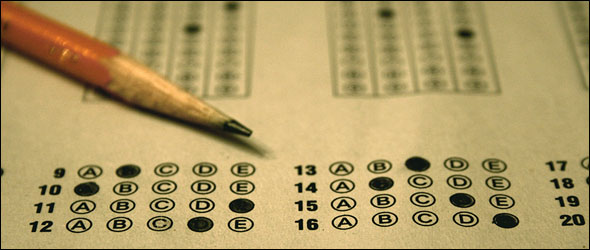If you aren’t preparing differently for each course, you’re doing it wrong
Categories: Undergrad

Getting high grades is a game
I have done extremely well academically in school my entire life, and I have done pretty well during my past two years of undergraduate biology. I also probably work less and study less than almost anyone, including students whose grades are as high as mine. The reason I have been so successful is because I understand that getting grades in school is essentially a “game”. The students who understand the rules of this “game” the best are the ones who get the highest grades.
Unfortunately, it would be impossible for me to explain all aspects of getting grades as a “game” in just one post. Instead, let’s focus this article on one key concept I always use when approaching my university courses, and one that I feel many students unfortunately neglect.
All professors test differently, therefore you should prepare differently
When I look around, I often see students approaching all of their courses in the same way. They take the same type and amount of notes in all their classes, and provide the classes with the same intensity of attention.
Yet if you saw me in class and watched how I paid attention, took notes, etc., you’d quickly notice that I approach all of my lectures very differently. I probably typed more notes than anybody in my biochemistry course last year, whereas I skipped a ton of my organic chemistry classes or barely even listened while I was there. Yet in the end, I aced both courses.
So why are my in-class habits remarkably varied? My habits are varied because the way the important (i.e. testable) information in my classes are delivered also vary. One of the most important attributes of a strong student is the ability to recognize what’s going to be on the test, and where to find that information.
Lecture-based vs. Text-book-based courses
In general, the important information is going to be found primarily in the lecture or the textbook, or some balance between both (depending on the professor). No two professors place exactly the same importance on these two resources, and you need to identify which professors test what they say, and which ones just pull concepts from the textbook.
When I take any course, my first goal is to quickly recogize which professors are lecture-based and which are text-book based (and which are in between). For example, I found out that my biochemistry classes were heavily lecture-based, so I listened very intensely in class and took very comprehensive notes, often typing word for word what the professor was saying. In many cases, he would tackle topics not even mentioned in the textbook. I would study from these lecture notes more than anything else, and rarely used the textbook in preparing for tests.
Conversely, I quickly found that my organic chemistry class was essentially text-book based. As a result, if I felt comfortable with the material, I saw no point in going to or listening in class. I’m not saying you should skip classes. What I am saying is that you should be cognizant of where the value lies, be it the lecture or the textbook, and adjust your attention to the more valuable one. I mean, why should I copy down notes that I know are already in the textbook?
In both cases, I saved a lot of time by focusing on the resource that provided the testable material, and not wasting time trying to study every single thing.
If this idea is so good, why do I still see students approaching all of their courses the same way?
I know a lot of students take the same types of notes and listen the same way in all their classes. They also study the textbook and lecture notes equally when preparing for tests. But why? A common reason students do this is because they have not taken the time to figure out where the testable material is coming from, and thus, need to study everything. Don’t fall into this trap! Spend time figuring this out. All of us can only put so much energy and effort into preparing for our courses. Why spend 50% of your effort trying to memorize an additional 1000 page biology textbook when knowing 100 PowerPoint slides was all you actually needed? Not to mention the times when you need to cram, and because of your diligence in understanding how your professor teaches, you can study more efficiently under pressure.
I mean, sure, if you had all the time in the world and extensive discipline, then by all means, focus during each class intensely and study every single resource you have. But if you’re like me, I’d rather study only what I need to and spend the rest of my day doing something else!
In short, it is important to recognize how each professor delivers their testable information. Figure that out, and then adjust your in-class habits and studying efforts towards getting that information. Not only will you be spending less time working or studying, buy you will also be using your energy most efficiently both during and after classes. I understand many students might feel uncomfortable with this approach, but trust me when I say it is definitely worth it.